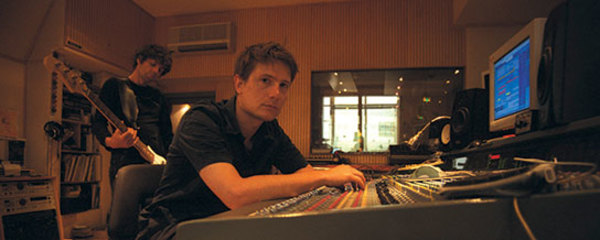Mouse on Mars In The Studio
Jan St. Werner makes electronic music so abstract and overloaded with ideas that it seems […]
Mouse on Mars In The Studio
Jan St. Werner makes electronic music so abstract and overloaded with ideas that it seems […]

Jan St. Werner makes electronic music so abstract and overloaded with ideas that it seems “post-everything.” In his solo work as Lithops and in collaboration with Andi Toma as Mouse on Mars, he is best known for translating postmodern concepts, dance rhythms, ambient excursions, and digital tomfooler into music that sounds like child’s play, as if the sounds are being thrown against walls to see if they break. Their brand of mutant techno can be heard in the mind-altering streaks on Mouse on Mars’ upcoming album, Varcharz, and the new Lithops record, Mound Magnetic, which St. Werner describes as “retro-futuristic, electro-acoustic, speed-improv” music. Along with his musical projects, St. Werner is the artistic director of Amsterdam’s Steim Institute, where electronic instruments and programs are researched and built.
XLR8R: What software programs does Mouse on Mars typically use?
Jan St. Werner: We use what everyone is using these days, which is a bit of Logic and then some Native [Instruments] packages. Native is a company we’ve worked with for a long time and we have a good relationship with them so they usually give us the latest tools or something that has not been fully finished yet. We try all of their gear.
What about analog gear?
There are a couple of MXR [analog delays] that we like. We have a lot of flangers, pedals, and a lot of Electro-Harmonix stuff and ring modulators, of course. We have compressors and EQs like DBX [120A Subharmonic Synthesizer], which [acts] like an extra bass and is a reason to add sub-bass to a bass drum, or even a synth or a bass guitar. And then we have fantastic tools like a Massenburg–an equalizer and a compressor. If you have that you don’t need much more.
What type of microphones do you favor?
Neumann U87, AKG C414, Shure, Sennheiser… We really love microphones. Andi is a microphone fanatic. He mics up everything. We bought some Radio Shack surface microphones–they have a flat, metal plate with a contact mic [inside that] detects the audio from a surface. It’s really good to mic up the drums to give them a spatial edge. Usually when we’re on tour in the US, in thrift stores we find some weird, old microphones. The weirdest is when you find a really good tool for cheap like a [Roland TB-] 303 for $30, and that’s what happened to us in France. Or like an Electro-Harmonix Doctor Q [pedal] we found for $50 in the US.
Do you use new studio techniques or instruments on the new Mouse on Mars record?
No. It’s more like the procedure of recording sounds, playing them, having some bits played like guitar and bass, and then editing them again, cutting them into pieces, and putting it all together again so it sounds like a band, but a virtual band. We did it with a rock attitude for the first time. It’s not because we wanted to sound like a rock band, but it [was inspired by] those live concerts as a trio and as a duo. We wanted to have a much more immediate, direct energy… But then of course, everything would be reconstructed again and reedited. It’s always this play with what is real or what is life, or what is a band or what is a studio thing, or what is electronic music or acoustic music. I think [it ‘s] these stereotypes that challenge us to twist things.
Can the ideas and material that you and Andi create in the studio become overwhelming at times?
It is overwhelming all the time; that’s what we look for. It’s like when people try to climb an even higher mountain or reach ground where no one has been before. We always find challenges that we haven’t had before, and that’s why we basically do it. We’re like this extreme team or something.
For the future, what are some ideas that you and Andi are playing with?
I think that the next thing we want to do is a real dancefloor album with a noisy side that brings a certain metallic-funk noise attitude into the clubs. We are quite far in this project and it’s something that you should expect for early next year, which is a real change for Mouse on Mars [laughs]. For us, it’s the most important thing to always come up with a change that is a surprise and hits you in the back of your head.

